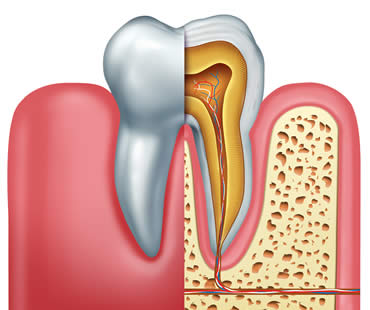
by Dr. Adkins | Jan 17, 2020 | Blog, Dental Topics 2, Root Canal Treatment
If the prospect of a root canal procedure has you running for the hills, you may want to consider reading over this list of frequently asked questions before you end up cowering in a corner:
- What is root canal therapy? Root canal treatment is performed when decay or trauma has damaged a tooth causing it to die. A dentist or endodontist performs a procedure to remove the diseased or damaged pulp from the tooth and then refills the tooth cavity.
- Is root canal therapy painful? In reality, root canal treatment is intended to relieve pain, not cause it. Because the procedures are very similar, you should experience no more discomfort than having a cavity filled.
- What happens after root canal therapy? Your tooth may be slightly sensitive for a few days, but over-the-counter pain relievers are usually sufficient to relieve any pain you may experience. In order for your tooth to return to full functionality, a crown or other restoration will need to be placed after the root canal therapy is performed.
- What if I opt not to choose root canal therapy? Untreated damage or infection in your tooth can travel through the roots and lead to an abscess or larger infection.
- Is there an alternative to root canal therapy? You could relieve the pain and infection by having your tooth removed. However, this can cause problems such as bone loss, migration of teeth, and bite problems.
In the case of a severely damaged or decayed tooth, the ideal solution is to save your natural tooth through root canal therapy and restoration. Contrary to popular belief, a root canal procedure is no more uncomfortable than having a filling placed in a cavity, and can have enormous benefits to your long-term oral health. Consult with your dental professional to get answers to any other questions or concerns you may have regarding root canal therapy so you can alleviate your fears and return to your healthy smile.
We treat patients from McDonough and the surrounding area

by Dr. Adkins | Jan 3, 2020 | Blog, Dental Topics 2, Root Canal Treatment
A toothache can make your life miserable. It may involve terrible tooth pain as well as headaches, sleeplessness, and difficulty eating. A trip to the dentist’s office is a must if you want relief. An examination might reveal that you need root canal treatment to save your tooth and eliminate your symptoms.
Severe tooth decay, a faulty crown, repeated tooth procedures or trauma are common causes of tooth damage. These issues can also lead to infection of your tooth’s pulp, which is on the inside of your tooth. Also called endodontic therapy, root canal treatment focuses on getting rid of the damaged tooth pulp. If infection is present, it is also removed. The root canal is thoroughly cleaned and disinfected, and then the area is filled with a special material called gutta-percha. Finally, the tooth is typically restored with a dental crown to provide maximum protection from future damage.
Some of the benefits you can expect from root canal treatment include chewing with normal biting force and sensation, maintaining natural tooth appearance, protecting other teeth from excessive wear, and avoiding a troublesome gap in the smile. In as little as one or two appointments, these benefits can be achieved without a great deal of discomfort. Innovations in technology have made the experience of root canal treatment usually no more painful or difficult than simply getting a dental filling. Once root canal treatment is complete, the tooth can last a lifetime with regular checkups and proper oral hygiene.
Schedule your appointment at our McDonough dental office

by Dr. Adkins | Dec 20, 2019 | Blog, Dental Topics 2, Root Canal Treatment
Root canal therapy is a painless procedure performed when decay has caused enough damage to a tooth that the tooth is dying or has already died. During treatment, your dentist or endodontist removes the diseased or damaged pulp from the tooth and then refills the tooth cavity. To ensure a successful and pleasant treatment, here are some basic do’s and don’ts to follow:
- Do take any medication your dentist has prescribed for you to take prior to root canal therapy.
- Don’t anticipate pain; be calm and relaxed during your treatment.
- Do expect mild discomfort for 2-3 days following the procedure. Apply an ice pack and sleep with your head elevated to minimize swelling.
- Don’t skip on taking prescribed pain medications, even if you are not experiencing extreme pain.
- Do avoid biting on hard foods or meddling with the affected tooth during the course of treatment.
- Don’t drink excessively hot or cold beverages until the completion of treatment.
- Do continue normal brushing on the root canal treated tooth.
- Don’t smoke or drink alcohol within 24 hours of root canal therapy.
- Do eat a soft diet for several days and avoid chewing on the treated tooth until a permanent restoration is placed.
- Don’t delay having the treated tooth capped with a crown or other restoration to avoid fracture or additional damage, causing failure of your root canal therapy.
- Do contact your dental professional immediately should you have any complications or questions during your recovery, and make sure to keep any follow-up appointments scheduled by your dentist or endodontist.
Root canal therapy has a 95% success rate. By following these simple guidelines, you can help to ensure a positive result from your root canal therapy and enjoy many more years of a healthy smile.
Our dental office is located in McDonough

by Dr. Adkins | Nov 1, 2019 | Blog, Dental Topics 2, Root Canal Treatment
Have you been told that you may need a root canal treatment? Are you worried because of things you’ve heard in the media about how “awful” a root canal is? Don’t worry about what you’ve heard; endodontic therapy isn’t at all what you’d think. Let’s debunk some myths!
- Myth #1: Root canal treatment is very painful. This isn’t true! In fact, a root canal treatment is performed specifically to relieve a patient’s pain, not to cause more. After a root canal treatment, you might feel some tenderness, but the pain you felt when the damaged tissue and infection was still inside the tooth will be completely gone. Once the swelling from the procedure has gone down, you will be able to use your new tooth exactly the way you could use your natural tooth when it was completely healthy.
- Myth #2: Root canal therapy or other endodontic work can lead to disease elsewhere in the body. Another falsehood! Root canal treatments don’t spread disease to the rest of the body, rather, they remove infected tissue and bacteria from the body, preventing the affected tooth from becoming re-infected.
- Myth #3: Extraction is better than root canal treatment. Extraction is not preferred to root canal treatment! Whenever possible, it’s preferred to keep your natural tooth. Your natural tooth’s roots stimulate and preserve the bone of your jaw, as well as providing adequate support to the surrounding teeth. Dental implants or dental bridges can be problematic, both in function and in dietary restrictions. In fact, an extraction can lead to several prolonged appointments to perform replacement procedures, treatments that are far more involved than a root canal treatment.
Endodontic treatment is an extremely common dental procedure that can provide durable, long-lasting restorations that will function as your natural tooth did. If you believe you may need a root canal treatment, talk to your endodontist or dentist today to see how this successfully proven treatment can help you and your smile needs.
We treat patients from McDonough and the surrounding area

by Dr. Adkins | Oct 25, 2019 | Blog, Dental Topics 2, Root Canal Treatment
A toothache can ruin your life, at least until you have treatment that relieves the pain. Headaches, mouth pain, or inability to chew can all accompany a tooth problem. It is not unusual for tooth pain to be linked to tooth decay, and when it becomes advanced you just can’t ignore it. This is when root canal therapy is valuable.
What is the procedure?:
Root canal treatment focuses on the pulp cavity, which is the inside of the tooth. When the pulp is infected or inflamed, it needs to be completely removed from the tooth in order for it to heal. It doesn’t matter if the damage to the pulp results from severe decay, tooth fracture, faulty crown, repeated dental procedures, or trauma. Even if the damage isn’t visible or causing unbearable pain, the bottom line is that the interior of the tooth must be cleaned out, disinfected and sealed to prevent future infection. A crown is typically placed on top of the tooth to protect it and complete the procedure.
Why is it necessary?:
If left untreated, an infected pulp can lead to intense pain or spread to other parts of the body. Root canal treatment is the best way to save the tooth and restore its function. Other benefits of the procedure are maintaining the tooth’s natural look, protecting other teeth from excessive wear, restoring normal chewing ability, and allowing normal sensation and biting force.
How long does it take?:
The procedure is more routine than you might think. An experienced dental professional can complete the process is one or two appointments, depending on your specific case. Once the procedure is complete, your repaired tooth should last as long as the rest of your teeth.
We look forward to seeing you in our McDonough dental office

by Dr. Adkins | Oct 11, 2019 | Blog, Dental Topics 2, Root Canal Treatment
If root canal treatment has been recommended for you, you’re probably a little nervous. Maybe you’re a LOT nervous, but if you’re thinking about putting off your treatment, don’t. If you need root canal therapy, the underlying conditions that necessitate it will not go away left untreated. In fact, they’ll just get worse and worse over time, causing you more pain and discomfort and potentially leading to more serious complications.
If you don’t treat the infection in your tooth, it will spread. Beginning at your tooth’s roots, it will travel to your jawbone and eventually to your healthy teeth. Your entire jawbone can be put at risk. By treating your infection promptly with root canal therapy, your mouth can be free of infection and you will begin the process of healing.
Serious diseases like heart disease and diabetes have been directly linked to gum disease. During pregnancy, many problems including low birth weight and premature birth can occur as a direct result of infection and bacteria in the mouth. Several types of cancers have all been shown to have a link to poor overall oral health. The mouth is truly the pathway for everything that goes into the body, and if it’s providing a steady stream of bacteria and infection to be spread throughout your body, it’s extremely problematic.
Don’t worry about pain following your procedure. Root canal therapies are meant to relieve pain, not cause it. You’ll be surprised how much better you’ll feel after your mouth is infection-free.
If you ignore your infected tooth for long enough, it may either fall out on its own or need to be extracted. Missing teeth come with a long list of oral issues, including difficulties with bite alignment and speech only corrected with some kind of dental restoration.
Don’t wait to have your root canal treatment. Don’t open yourself up to the myriad of consequences that could result from postponing treatment.
If you live in the McDonough area contact us today








 (470) 665-5292
(470) 665-5292  E-Mail Us
E-Mail Us 
